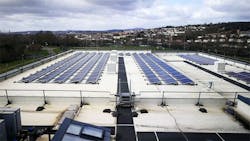Welsh Schools and Facilities gaining rooftop Solar under Community-owned Model
Solar cooperative Egni will install rooftop solar panels for three schools, a care home and a crematorium in Newport as part of the government’s support to increase community-owned renewable energy in Wales.
The installation project received funding of approximately £2.35 million. The solar panels will generate 2 MW of electricity. It is expected to provide significant savings on electricity bills and 3,700 tons of carbon. Egni will own and manage the panels.
Deputy Climate Change Minister Lee Waters MS said the government wants Wales to generate renewable energy to meet its energy needs and use the surplus energy generated to tackle nature and climate emergencies. To achieve net-zero by 2050, the Minister said the amount of green energy will have to be increased five-fold over the next 30 years. He added, “Community owned energy builds local energy resilience through cleaner, greener means – vital in our efforts to reach a Net Zero Wales by 2050, and help schools, hospitals and communities protect themselves against rising living costs.”
Egni has already connected solar panels, generating 4.3 MW of energy to 90 buildings in Wales. The government aims to increase renewable energy generation by community groups and public bodies by more than 100 MW by 2026.
About the Author
EnergyTech Staff
Rod Walton is head of content for EnergyTech.com. He has spent 17 years covering the energy industry as a newspaper and trade journalist.
Walton formerly was energy writer and business editor at the Tulsa World. Later, he spent six years covering the electricity power sector for Pennwell and Clarion Events. He joined Endeavor and EnergyTech in November 2021.
He can be reached at [email protected].
EnergyTech is focused on the mission critical and large-scale energy users and their sustainability and resiliency goals. These include the commercial and industrial sectors, as well as the military, universities, data centers and microgrids.
Many large-scale energy users such as Fortune 500 companies, and mission-critical users such as military bases, universities, healthcare facilities, public safety and data centers, shifting their energy priorities to reach net-zero carbon goals within the coming decades. These include plans for renewable energy power purchase agreements, but also on-site resiliency projects such as microgrids, combined heat and power, rooftop solar, energy storage, digitalization and building efficiency upgrades.
